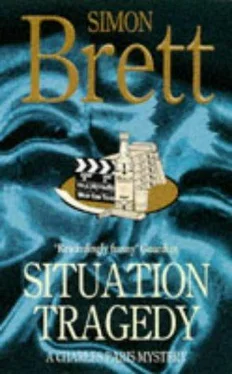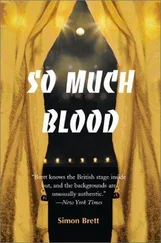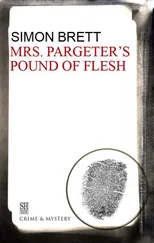Simon Brett - Situation Tragedy
Здесь есть возможность читать онлайн «Simon Brett - Situation Tragedy» весь текст электронной книги совершенно бесплатно (целиком полную версию без сокращений). В некоторых случаях можно слушать аудио, скачать через торрент в формате fb2 и присутствует краткое содержание. Жанр: Классический детектив, на английском языке. Описание произведения, (предисловие) а так же отзывы посетителей доступны на портале библиотеки ЛибКат.
- Название:Situation Tragedy
- Автор:
- Жанр:
- Год:неизвестен
- ISBN:нет данных
- Рейтинг книги:3 / 5. Голосов: 1
-
Избранное:Добавить в избранное
- Отзывы:
-
Ваша оценка:
- 60
- 1
- 2
- 3
- 4
- 5
Situation Tragedy: краткое содержание, описание и аннотация
Предлагаем к чтению аннотацию, описание, краткое содержание или предисловие (зависит от того, что написал сам автор книги «Situation Tragedy»). Если вы не нашли необходимую информацию о книге — напишите в комментариях, мы постараемся отыскать её.
Situation Tragedy — читать онлайн бесплатно полную книгу (весь текст) целиком
Ниже представлен текст книги, разбитый по страницам. Система сохранения места последней прочитанной страницы, позволяет с удобством читать онлайн бесплатно книгу «Situation Tragedy», без необходимости каждый раз заново искать на чём Вы остановились. Поставьте закладку, и сможете в любой момент перейти на страницу, на которой закончили чтение.
Интервал:
Закладка:
Since he didn’t really think anything, he didn’t say anything, but his lack of response did not deflect Debbi from the course of her debate.
Charles looked round. The coach was filling up. Mort Verdon stood at the front, checking names against a clipboard. Janie Lewis entered importantly, carrying piles of bits of paper. He contemplated joining her and exchanging discussion of hair length for that of the relative merits of film and mobile VTR recording, quoted directly from Ernie Franklyn Junior or some other guru of the W.E.T. canteen. There wasn’t much to choose in conversation; the only difference was that he did fancy Janie, whereas he didn’t fancy Debbi.
On the other hand. . By the time the coach was on Westway, his eyes had closed. Beside him, Debbi Hartley continued to enumerate her virtues as an actress. It was half an hour before she noticed he was asleep.
Bernard Walton lived in a large house, set on a hill between Cookham and Bourne End. Charles woke up as the coach turned off the main road into his drive. The house was at this point invisible because of the steepness of the incline, but the approach was impressive. A gravel drive zigzagged up through immaculately planted gardens. Neat stone walls bordered it and on these, at intervals, stood tall terracotta urns from which variegated displays of flowers spilled.
As the coach groaned and protested through its lowest gears on the hairpin turns, its occupants could see the view the house commanded. At the foot of the hill, green, flat water-meadows spread to the broad gleam of the Thames. Beyond, woods obscured most signs of human habitation.
Round one last corner and they saw the house itself. It was Thirties Tudor, black and white, not scoring many aesthetic marks, but impressive just for its bulk and position. A tennis court and a service cottage brought right angles to the landscaped curves of the garden. Beyond a neat privet hedge could be seen the polite undulations of a golf course. If the whole location had a manufactured air, it was very fitting for the character of its owner.
Bernard Walton stood in front of the large oak door waving welcome. More than welcome, he was waving possession and condescension. By allowing The Strutters to use his home, he had given the series his seal of approval. But he had also diminished it, as if it existed only by his mandate.
Charles caught George Birkitt’s eye. ‘Ostentatious bugger,’ murmured the star of The Strutters .
‘All part of the image,’ said Charles lightly.
‘Yes. God, if I had his money, I hope I’d show a little bit more reticence.’ But there was a note of wistfulness in George Birkitt’s voice. Bernard Walton’s house had struck a psychological blow against him. He might be the star of The Strutters and he might be about to make a great deal of money. But he hadn’t made it yet. Whatever his fantasies, he had still a long way to go to catch up with a real, established star.
Bernard Walton greeted them effusively. ‘Do make yourselves at home. I’m just pottering around today, so ask if there’s anything you need. The Sun ’s coming down to do an interview this morning and I’m recording a few links for some radio show this afternoon, but otherwise I’m completely at your disposal. Do remember you’re my guests.’
This was pure Bernard Walton and Charles couldn’t help admiring it. He felt sure the star had deliberately set up the newspaper and radio bits to coincide with the filming day, so that no one should forget his importance. The pose of the self-denying host was also typical, and it was a gesture that was very easy to make. The usual filming back-up services, location caterers, make-up caravans and so on, already had their transport drawn up on the gravel. Even lavatories were available in the various vehicles, so the demands on Bernard Walton’s hospitality would be minimal. And he would certainly have arranged a suitable fee with the Location Manager to cover any mild disruption which the filming might occasion.
Already there were a few signs of activity around the location. Men in blue nylon anoraks moved cables and huge lights on wheeled tripods. Make-up girls checked for any deterioration in their handiwork that the coach trip might have caused. Dressers inspected costumes for invisible flecks. Mort Verdon flounced around checking props. The men whose only function seemed to be to wear lumberjack checked shirts wore their lumberjack checked shirts and discussed overtime rates ominously. Midge Trumper (yes, the Midge Trumper), the cameraman, inspected his camera. Janie Lewis, her neck festooned like a Hawaiian princess s with pens on thongs and stopwatches on thongs, moved about, aimlessly purposeful.
But there seemed no momentum to any of the activity. It wasn’t just the slow pace of everything, which is de rigueur in television, there was an even greater lack of purpose. It took Charles a minute or two to realise that this was due to the absence of the Director.
Scott Newton had not been in the coach; he had insisted on coming to the location under his own steam.
Even as Charles remembered this, the throaty roar of an engine and a fusillade of gravel announced both Scott Newton’s arrival and the nature of the steam under which he was arriving.
A brand-new silver Porsche screeched to a halt beside the coach and the young television director bounced out, looking, in his tinted glasses, his ginger corduroy blouson suit and his white soft-leather French boots, exactly as a young television director should look.
‘Morning, crew and artists,’ he cried. ‘Let’s get this show on the road. Is everyone here?’
Mort Verdon fussed up to him. ‘Not quite everyone, dear. Dob wasn’t coming in the coach. Hasn’t arrived yet.’
‘Okay, let’s start with one of the other set-ups that doesn’t involve her. What about the Colonel being chased by Reg the barman?’
Slowly this message filtered through, and men and equipment started to move slowly to the side of the house where the first set-up was to be. Even the men whose only function was to wear lumberjack checked shirts deigned to wear them over there.
Charles couldn’t help noticing the new confidence that illuminated Scott Newton. He decided that it was because they were filming. Film still has a glamour and tradition, and it is easier for a director to fit into the supercool Hollywood stereotype on location than it is in the prosaic and crowded setting of a studio. But Scott Newton was also obviously in the money. The new clothes and, more than that, the new car made it clear that his agent had negotiated a very favourable contract for The Strutters . Scott Newton no longer looked like a man with financial worries.
Charles found himself beside the young man while they waited for George Birkitt to change into the relevant tweeds for the scene ahead and, because he thought Scott would appreciate it, commented that the Porsche was a very smart motor.
Scott’s reaction proved him right. Clearly not enough people had made the observation. ‘Yes, not bad, is it?’ he agreed airily. ‘Really good to feel a bit of power under your foot. Drinks petrol, of course, but. .’ he shrugged, ‘. . if you want the power. .’
‘Must have set you back a bit.’
‘It’s leased, actually. Makes sense. My accountant says I’m going to have to pay so much in tax this year that I may as well offset what I can.’
Yes, his agent had certainly negotiated a good contract. Life seemed to have come right for Scott Newton. Any agonising he might have had about the wisdom of leaving the BBC had dissipated. He was now director of a major series, which would lead to other major series and. . Nothing could stop him.
Charles couldn’t help thinking of Walter Proud. He had once talked in exactly the same brashly confident tones.
Читать дальшеИнтервал:
Закладка:
Похожие книги на «Situation Tragedy»
Представляем Вашему вниманию похожие книги на «Situation Tragedy» списком для выбора. Мы отобрали схожую по названию и смыслу литературу в надежде предоставить читателям больше вариантов отыскать новые, интересные, ещё непрочитанные произведения.
Обсуждение, отзывы о книге «Situation Tragedy» и просто собственные мнения читателей. Оставьте ваши комментарии, напишите, что Вы думаете о произведении, его смысле или главных героях. Укажите что конкретно понравилось, а что нет, и почему Вы так считаете.












